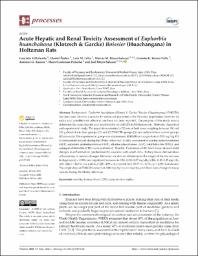Acute Hepatic and Renal Toxicity Assessment of Euphorbia huanchahana (Klotzsch & Garcke) Boissier (Huachangana) in Holtzman Rats

Ver/
Descargar
(application/pdf: 5.058Mb)
(application/pdf: 5.058Mb)
Fecha
2022-06-30Autor(es)
Villafuerte, Graciela
Ñañez, Daniel
Félix, Luis M.
Moya-Salazar, Marcia M.
Torres-Véliz, Ernesto R.
Ramos, Antonio G.
Contreras-Pulache, Hans
Moya-Salazar, Marcia M.
Metadatos
Mostrar el registro completo del ítemResumen
Background:Euphorbia huachahana (Klotzch & Garcke) Boissier (Huachangana)(EhKGBh)has been used for over a century for medicinal purposes in the Peruvian population; however, itssafety and possible toxic effects of use have not been reported. The purpose of this study was todetermine the acute hepatic and renal toxicity of EhKGBh in Holtzman rats. Methods: Analyticaland experimental study. The population consisted of 52 rats of both sexes weighing between 300 and350 g divided into four groups: G1 and G2 EhKGBh groups (26 rats each) and two control groups(10 rats each). The experimental group was administered EhKGBh at a single dose of 2000 mg/kg P.O.to demonstrate toxicity during the 14-day follow-up. A daily assessment of alanine aminotransferase(ALT), aspartate aminotransferase (AST), alkaline phosphatase (ALP), total bilirubin (TBIL), andconjugated bilirubin (CBIL) was performed. Results: Evaluation of the liver tissue showed mildchanges in inflammation, predominantly vascular, with small clots. Kidney tissue did not showinflammatory or necrotic changes. However, we showed differences in the weight of the rats betweenboth groups (p< 0.004) and significant increases in TBIL (0.98–1.07 mg/dL), CBIL (0.43–0.45 mg/dL),AST (126.4–141.8 U/L), and ALP (254–298 U/L) but not ALT (39.7–41.1 U/L) (p< 0.05). Conclusion:The single dose of EhKGBh extract at 2000 mg/kg has no toxicity, and there is no change in tissuetoxicity during the 14-day follow-up.
Palabras clave
Colecciones
- SCOPUS [380]

